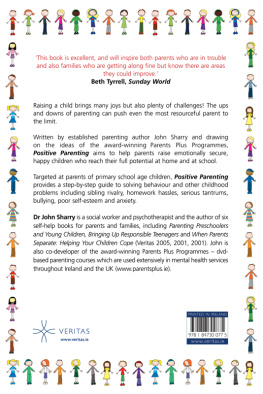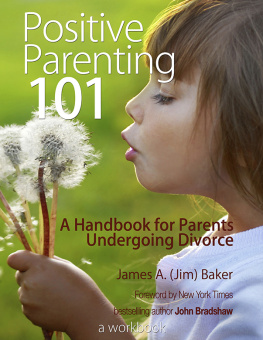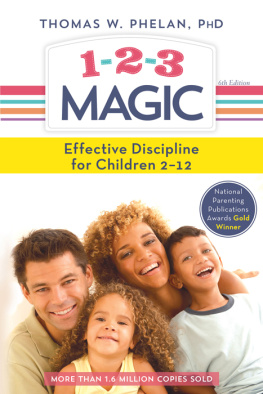The material in this publication is protected by copyright law. Except as may be permitted by law, no part of the material may be reproduced (including by storage in a retrieval system) or transmitted in any form or by any means, adapted, rented or lent without the written permission of the copyright owners.
Applications for permissions should be addressed to the publisher.
Introduction
Loving and responsible Parenting
Getting The Balance Right

It can be hard being a parent these days. Parents are busier than ever and many of the traditional supports that we relied upon are no longer there. There is increased pressure on parents to get it right. There are pressures to be positive and encouraging, while also being good disciplinarians, teaching our children right from wrong. We are also expected to be there for our children, supportively involved in their lives, while also holding down employment and providing for our families.
Good parenting is essentially about achieving balance. The key is to achieve balance between the needs of our children and our own needs as parents; between the need to encourage and love children and the need to provide them with rules and discipline.
In this book we argue that effective parenting involves achieving balance between Positive Parenting providing your children with positive attention (through play/special time, listening, praise and encouragement etc.) and also Positive Discipline teaching children how to be responsible by setting clear rules and being firm about them. Both are essential in bringing up children well, teaching them how to behave responsibly and helping them be happy and emotionally secure adults.
Sometimes the problems in society are blamed on children not being cared for properly or suffering neglect as children (e.g. not experiencing positive parenting). Other times these problems are blamed on a lack of discipline in the childs upbringing parents letting their children get out of control or failing to set proper rules. The truth lies somewhere in the middle: children need both loving and caring parenting as well as clear discipline and rules. The secret is getting the balance right.
Problems occur when the balance is out of kilter; when children do not receive enough encouragement, support and understanding and when they do not receive firm, authoritative parenting. This book is all about helping parents get that balance right.
Empowering Parenting

Parenting is also a balance between supporting children in making decisions for themselves and making decisions for them as parents; between allowing them to learn for themselves and protecting and teaching them. This is a challenging balance you have to get right as children grow up and one that you have to constantly renegotiate as they become increasingly independent. It is important as a parent to remember the long-term goal to empower children to grow up into secure, happy adults who can make responsible decisions for themselves.
Many writers describe family life as like embarking on a plane journey together: you start the journey with a destination in mind and a navigation plan, but throughout the journey you can get thrown off course by other factors, such as wind or rain or other air traffic. Being off-course is in fact quite normal. As Stephen Covey, author of The Seven Habits of Highly Effective Families, says: Good families even great families are off track 90 per cent of the time! What matters most is that you keep returning to your original course and you keep the destination in mind. Dont let events throw you off-course permanently keep returning to the flight plan.
The metaphor of a plane journey also describes the long-term aim of parenting. When a child is born, the parent is in the pilots seat, very much in charge of the controls. Parents make all the decisions about infants and young childrens lives, about what they wear and where they go etc. As a child begins to get older, a good parent allows the child into the cockpit and begins to teach them how to operate the controls. The child begins to make some decisions for themselves and learns how to do some flying under the supervision of the parent. As the child becomes a teenager, they begin to fly their own plane, with the parent still present as a teacher/supporter, before proceeding to fly their plane as an adult.
Start With caring For Yourself As A Parent

As well as caring for their children, it is also important for parents to prioritise their own welfare and personal development. This is another crucial balance that is important to achieve. Unfortunately, it is easy to get this balance out of kilter and many parents are stressed and burnt out. They have put all their energies into caring for and attending to their children, so much so that there is little time and attention for themselves. While their intentions are admirable, the long-term results are bad for themselves and their children. If you are stressed and burnt out, you can no longer be there for your children; you can even become negative, inconsistent and resentful in your parenting. So you really have to turn this around and start with yourself.
The first suggestion we give to stressed parents is that they try to turn some of the care and attention that they have lavished on their children towards themselves. We suggest that they take time to identify and think about their own needs and wants, and then decide to prioritise and care for themselves as well as their children. The irony is that such a switch to self-care benefits their children as much as themselves, as the children will have access to more content, positive and resourced parents than before. Most of this book is about ways of providing positive attention and care to children and teenagers, whether this is by praise, encouragement, rewards or respectful listening and communication. The first step, however, is to make sure we treat ourselves the same way!
Build on Your Strengths As A Parent
You will notice that throughout this book we encourage you to build on your childrens strengths and abilities. We also encourage you to apply the same principles to yourself. Too often parents give themselves a hard time, criticising their own behaviour and putting themselves down. Too often they focus on what they do wrong in every situation: I wish I hadnt lost my patience like that or I should have more time for my children. Similarly, parents can relate negatively to each other, focusing on what the other has done wrong: I dont like the way you interrupted me talking to the kids or You shouldnt have lost your temper.











